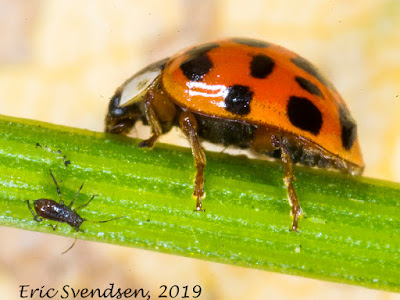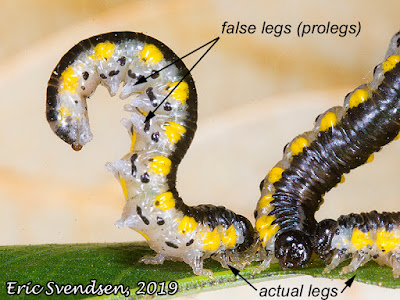The Mountain Pine Beetle - still a problem.
 |
| The Mountain Pine Beetle adds another casualty to its list. |
Have a look at the tree stump in the center image above. Notice the bluish bands penetrating the log from the outside edge. That is the fungus associated with the Mountain Pine Beetle (MPB). There is a symbiotic relationship between the two organisms. Pine trees produce a thick resin (top image) which thwarts pine beetle infestation. The beetle carries the fungus on its mouthparts; when it attacks a tree the fungus is released and parasitizes the tree, growing ever inward over time. The beetle benefits from this because the fungus reduces the resin production by the tree allowing the beetle to attack it without mercy. The fungus benefits because it is given the opportunity to grow and obtain energy from the tree's tissues.
The tree dies because the MPB drills pathways called galleries in the cambium layer. This is the thin layer just underneath the bark which the tree uses to pass nutrient loaded sap to the tree roots. When this pathway is interrupted it the roots starve and the tree eventually dies.
The MPB is native to the western reaches of Canada. Its existence has not been the issue, unlike other species such as purple loosestrife, which is an invasive plant. It has become a problem because of global warming. Normally cold winters would kill off a significant portion of the larvae and prevent a massive release of adults in the spring. Mild winters in the last decade or two have allowed the beetle larvae to thrive. More and more adults emerge every year and they migrate to unaffected areas looking for new individuals to invade. The resulting epidemic has killed an enormous portion of the pine population. The remaining deadwood is dry and the perfect tinder to produce the kind of wildfires we have recently seen. Last year was the worst year on record in BC for forest fires; the year before that set the previous record.
When global warming starts to cause problems in your own back yard people tend to start thinking there is something to this theory. Our lack of response and determination to reduce, if not reverse, global warming is putting us on the fast track to destruction. It won't be long before the rapidly decreasing pine population will have something in common with us. We both will be casualties of global warming.



Comments
Post a Comment